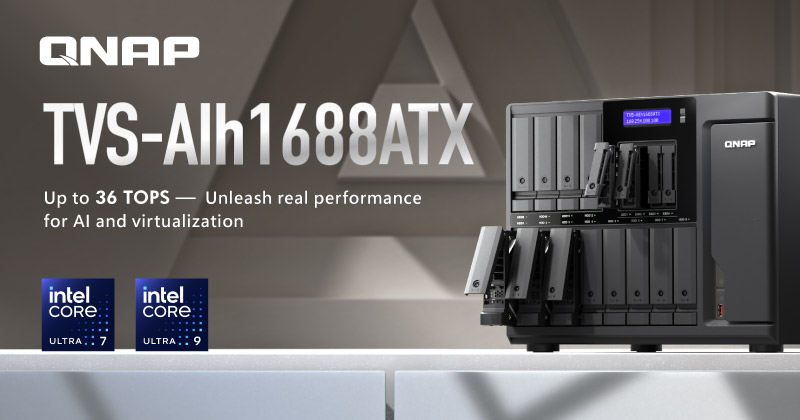QNAP Newsroom
Keep up to date with the latest QNAP news, awards and connect with our team
QNAP Launches TVS-AIh1688ATX AI NAS with 36 TOPS for AI and Virtualization
A new era of AI-accelerated enterprise NAS: High-performance computing meets scalable, centralized storage

Taipei, Taiwan, October 27, 2025 – QNAP® Systems, Inc., a leading computing, networking and storage solution innovator, today launched the TVS-AIh1688ATX, an enterprise-grade AI NAS that integrates the latest Intel® Core™ Ultra processors and Neural Processing Unit (NPU), delivering up to 36 TOPS of total AI performance. Designed for AI-powered image/video analytics, virtualization, multimedia processing, and large-scale backup, the TVS-AIh1688ATX offers 12 SATA HDD bays and 4 U.2 NVMe/SATA SSD slots, with support for High Availability (HA) architecture, Thunderbolt™ 5, and 100GbE network expansion—making it a powerful edge AI storage platform for future-ready enterprises.
“Businesses running AI and data-heavy workloads need more than speed—they need agile, scalable infrastructure,” said Andy Chuang, Product Manager at QNAP. “With the TVS-AIh1688ATX, we deliver balanced compute, storage, and collaboration capabilities to help customers confidently manage data, computation, and teamwork as business challenges grow more complex.”
TVS-AIh1688ATX key features
- AI performance redefined: Powered by up to Intel® Core™ Ultra 9 (24-core, 24-thread, up to 5.6 GHz) or Intel® Core™ Ultra 7 (20-core, 20-thread) processors with built-in NPU, GPU, and AES-NI support, the system delivers up to 36 TOPS—ideal for AI inference, image analytics, and multimedia workloads.
- Integrated Intel® Arc™ Graphics: Offers efficient GPU acceleration for high-resolution image and video processing, enabling parallel execution of visual workloads and compute tasks.
- DDR5 ECC memory: Supports up to 192 GB memory for improved performance and system reliability, perfect for virtualization, AI training, and data-intensive applications.
- 4x U.2 NVMe PCIe Gen 4 x2 / SATA SSD slots: Enable high-speed SSD storage pools or cache acceleration for latency-sensitive applications like virtualization, AI model access, and 4K/8K video editing.
- Integrated 2x 10GBASE-T (10G/1G) and 2x 2.5GbE ports: Supports Port Trunking and failover. Optional 25GbE or 100GbE PCIe expansion provides future-proof network scalability.
- 3x PCIe Gen 4 expansion slots: Expandable with 10/25/100GbE network cards, storage expansion cards, or QM2 cards to add M.2 SSDs or extra LAN ports.
- PB-scale storage expansion: Seamlessly scale storage to petabyte levels by connecting QNAP JBOD units. Ideal for long-term archiving and compliance-driven data retention.
- USB 4 and Thunderbolt™ 5 support: Includes 2x USB 4 Type-C ports (Thunderbolt™ 3/4 compatible) and supports the QXP-T52P Thunderbolt™ 5 expansion card, enabling up to 4 direct-connected editing workstations—ideal for media collaboration and high-speed creative workflows.
- ZFS-based QuTS hero operating system: Provides enterprise-grade features including self-healing, ZIL power loss protection, WORM for data immutability, in-line data deduplication, near-unlimited snapshots, and SnapSync for DR (disaster recovery).
- High Availability: Build active-passive HA clusters with dual NAS systems to ensure business continuity and minimize unplanned downtime.
- Hybrid cloud backup with myQNAPcloud One: Supports both file and S3 object storage with free data transfer. Easily build an offsite backup strategy and manage data in a unified hybrid cloud environment.
For more information and to view the full QNAP lineup, please visit www.qnap.com.
About QNAP
QNAP (Quality Network Appliance Provider) is devoted to providing comprehensive solutions in software development, hardware design and in-house manufacturing. Focusing on storage, networking and smart video innovations, QNAP now introduce a revolutionary Cloud NAS solution that joins our cutting-edge subscription-based software and diversified service channel ecosystem. QNAP envisions NAS as being more than simple storage and has created a cloud-based networking infrastructure for users to host and develop artificial intelligence analysis, edge computing and data integration on their QNAP solutions.





